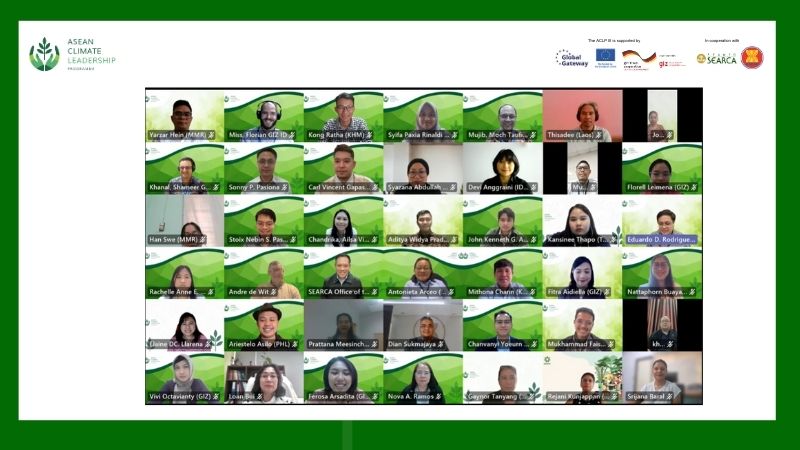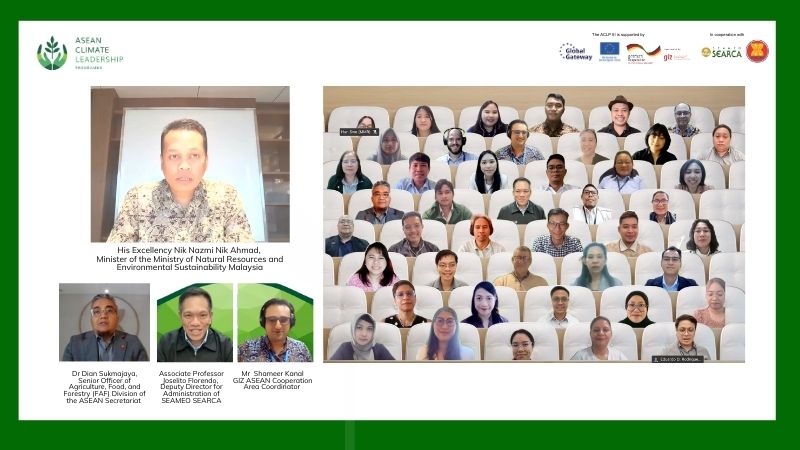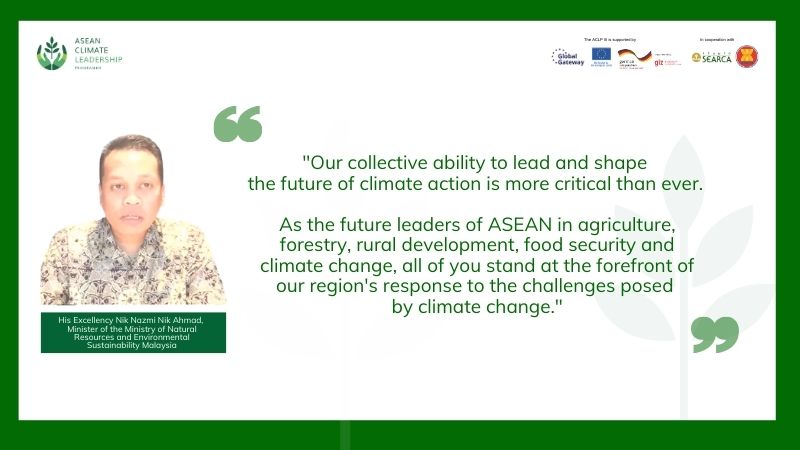
The third run of the ASEAN Climate Leadership Programme (ACLP III) officially started through its opening session and first module lectures held virtually from 22 to 23 January 2025.
The 29 official participants representing Brunei Darussalam, Cambodia, Indonesia, Lao PDR, Myanmar, the Philippines, Thailand, and Vietnam were selected out of over a hundred applicants across the ASEAN Member States. Following the successful implementation of the previous runs in 2020 and 2021, this is the first time that ACLP has offered in a blended learning modality through online and face-to-face sessions that will be held in Bali, Indonesia and Bangkok, Thailand.
The ACLP III is a six-month program designed to increase knowledge, strengthen skills, and foster attitude shifts in leadership particularly in the thematic areas of climate policy, climate-smart agriculture (CSA), and inclusivity. Participants will enhance their leadership skills by initiating ideas and facilitating change through their "Personal Change Project" that will benefit their chosen sector or community. Their projects would drive collective and cross-sectoral transformative actions in agriculture, forestry, rural development, food security, and climate policy.
The challenge for ASEAN climate leaders
Countries in the ASEAN region are vulnerable to the adverse effects of climate change due to their long coastlines, dependency on agriculture and forestry, and land-use sectors. The ACLP therefore recognizes the importance of strengthening leadership in climate change dialogue at the international level.

"It is indispensable to have a concerted effort and same understanding on how to strengthen the ASEAN position as a group to push forward the climate action in the region, particularly for the agriculture and forestry sector," Dr. Dian Sukmajaya, Senior Officer of Agriculture, Food, and Forestry (FAF) Division of the ASEAN Secretariat, said during the opening session.
Associate Professor Joselito Florendo, Deputy Director for Administration of SEAMEO SEARCA, and Mr. Shameer Kanal, GIZ ASEAN Cooperation Area Coordinator, also highlighted these aspects during the opening session. Both expressed their enthusiasm and support for the participants to take advantage of the learning and mentoring opportunities of ACLP III.
Assoc. Prof. Florendo urged the participants to "become better climate leaders who can deliver transformative, relevant, and effective programs and policies to their respective communities, countries, and the ASEAN region." He also acknowledged the ACLP III technical learning facilitators, mentors, and coaches whose involvement is vital to the participants' completion of program outputs.
The challenge remains for the ASEAN region to keep up with the present and prepare for the future amidst climate change threats. Mr. Kanal urged the participants to realize their potential as climate leaders who can champion and mobilize action across sectors, drive systematic changes, and ensure a just transition for all. He encouraged them to take advantage of the ACLP III opportunity to be "the catalyst for professional growth and make it a stepping stone toward a more sustainable and equitable future not only for the ASEAN but also for the world."
In his message to the participants, H.E. Nik Nazmi Nik Ahmad, Minister of Malaysia's Ministry of Natural Resources and Environmental Sustainability, noted that the ASEAN is facing immediate impacts of climate change, which is a global problem. Moreover, the ASEANis one of the most vulnerable regions that are exposed to this challenge.
Minister Nik Nazmi Nik Ahmad emphasized that "the complexity and scale of this crisis demand us to be empowered at every level of leadership. Our collective ability to lead and shape the future of climate action is more critical than ever."
"While targets are important and it's about accountability, effective leadership must go beyond simply setting targets. It has to be a collective action-oriented approach that empowers each of us to take responsibility," he added.

Building the foundations of ACLP III
Technical lectures of the first module of ACLP III started right after the opening session, which continued the following day. Module 1 focused on deepening the participants' understanding of the status of climate actions in relation to the Paris Agreement, the integration of sustainable agriculture and food systems into enhanced Nationally Determined Contributions (NDCs), the ACLP leadership model, leadership development plans, and an introduction to Theory-U and Systems Thinking.
Andre de Wit, Dean of Amsterdam Leadership Academy, and Gaynor Tanyang, Managing Director of Lumina Ventures, are the lead facilitators of ACLP III. Other resource persons in the first Module were:
- His Excellency Nik Nazmi Nik Ahmad, Minister of the Ministry of Natural Resources and Environmental Sustainability Malaysia, who shared insights on Malaysia's own climate change journey and encouraged the participants to be empowered and resilient ASEAN leaders in climate policy and action;
- Dr. Fahmuddin Agus of the National Research and Innovation Agency in Indonesia, who presented innovations in climate policy and implementation such as concerns on global warming, the need for emission reduction, agricultural systems and main sources of emissions, CSA as a strategy for adaptation and mitigation; and
- Dr. Vong Sok, Head of Environment Division of ASEAN Secretariat, who tackled the ASEAN Policy Framework, the institutional framework for addressing climate change, ASEAN's Climate Action initiatives, and its priorities.
Aside from the technical lectures, the participants had enriching interactions in small group learning sessions, Q&A sessions, and other online interactive activities in between the introduction of new concepts.
The ACLP III is jointly organized by the ASEAN-EU-German Climate Action Programme (CAP) and Promotion of Sustainable Agricultural Value Chains in ASEAN (ASEAN AgriTrade II), with funding from the German Federal Ministry for Economic Cooperation and Development (BMZ) and co-financed by the European Union (EU), implemented by Deutsche Gesellschaft für Internationale Zusammenarbeit (GIZ) GmbH. The program is coordinated with the ASEAN Secretariat, specifically the Food, Agriculture, and Forestry Division (FAFD) and the Environment Division (ED). The SEAMEO Southeast Asian Regional Center for Graduate Study and Research in Agriculture (SEARCA) provides technical and knowledge management support.
Check the video here: